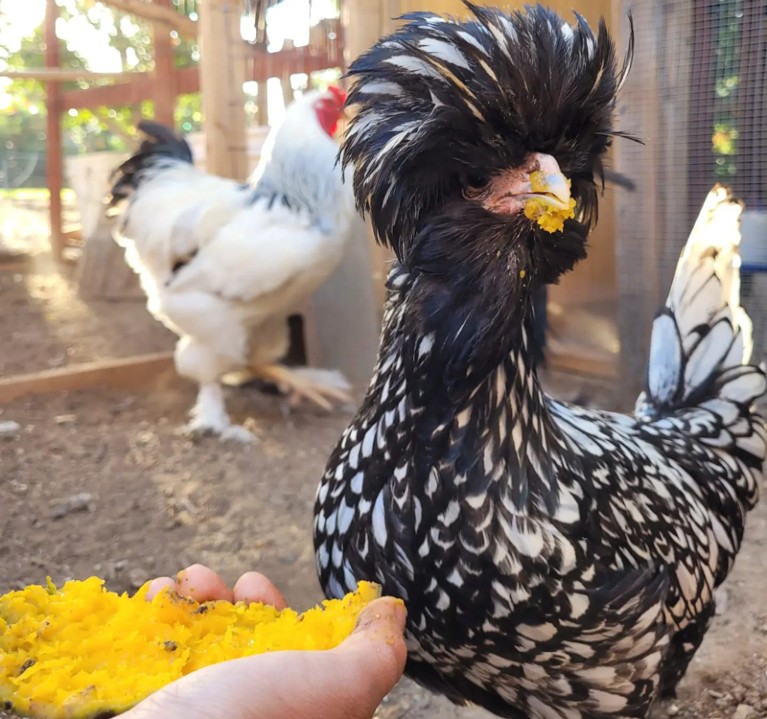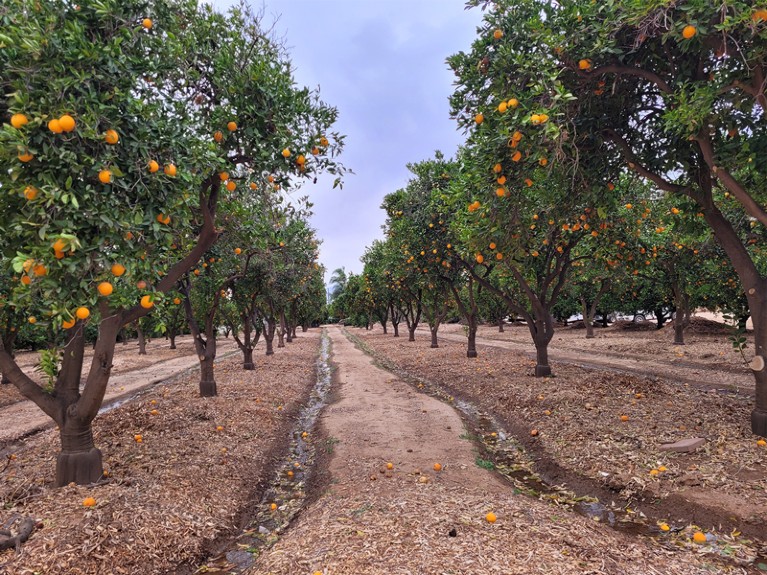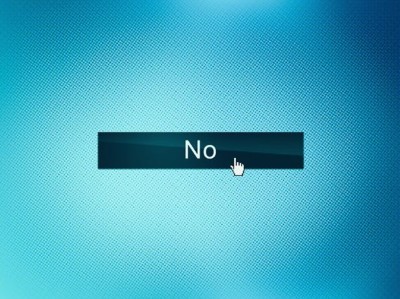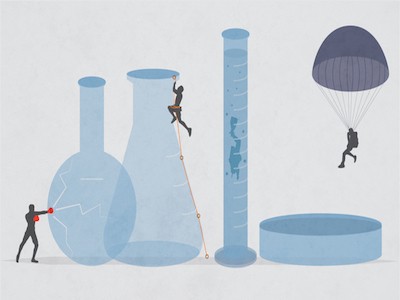How a hobby farm taught me to set priorities in academia

Not just chicken feed: Pen-Pen enjoys butternut squash from their own garden.Credit: Brandon Brown
The day I got the news of my promotion to full professorship, it was a few hours after dawn outside on my hobby farm, tending the orange grove and the chickens and weeding. It was already a productive day and I found that the peaches were finally ready to be picked. I wondered what news I should share first with my family, friends, and those who had supported me for decades to get to this point in my life.
Today I have taken good care of my trees and plants and my animals are healthy and stable. I became a farmer at the end of 2020. It was far into the COVID-19 pandemic and as an epidemiologist trained in infectious diseases, I knew things would not end anytime soon – despite the many tools we had at our disposal to prevent transmission. As a result, I wanted more outdoor space to grow my own food and be able to physically distance myself. My family and I sold our house and bought a smaller house with significantly more land including hundreds of fruit trees and plants – along with a flock of chickens and a group of farm cats.

Rows of orange trees in bloom on the farm.Credit: Brandon Brown
We later realized the tremendous effort required to maintain the site and keep the flora and fauna healthy. I was initially worried about how this would affect my academic work, travel, and productivity. For the first few months, the workload of maintaining the farm was overwhelming. But much like learning to write a manuscript, prepare a grant application, or teach a course for the first time, things got easier—and though mistakes were made, I adjusted.
But adaptation meant pushing new boundaries in a remote work environment where academics are expected to be always available. Many of my colleagues, like me, still have back-to-back video meetings from 8am to 6pm, which means the actual work discussed has to be done in the evenings and weekends.
Digging for inspiration
At first, I thought that every hour I spent in the country supporting life outside meant an hour less for meetings and academic productivity. But I found that the time I spent working outside with a shovel enabled deep thinking and inspired the creativity I needed to innovate and solve problems for research. It has also helped me generate ideas to support underrepresented students and engage with my other work at the University of California (UC), Riverside. The hour outside contributed to my productivity in many ways and allowed me to prioritize my own priorities and not those of others.
It has helped change my expectations of myself and what others have of me. But being able to change those expectations was only possible because of my privilege. I am White Latino, cisgender and able-bodied with a supportive family around me. And, crucially, I now have a job, which is like winning the lottery in science, and it gives me more control over how I use my time. I’m happy to be in this position.

Why four scientists said no for a year
That’s not to say I’ve retired from academia. I definitely spend hours every day in meetings, teaching and mentoring individual students and young faculty members. The difference is that I now protect my time and calendar by asking myself if my presence is absolutely necessary – and if not, I have the privilege of being able to decline. I also schedule more afternoon meetings so I can have the early hours to work outside and do my farm duties; this gives me a more balanced life.
Beyond the fire department
I have slowly learned that my academic career and scientific activities – including applying for grants and awards and preparing publications – need not define me, as does so many in my field, and that my experience as a farmer part of it is who i am. Respecting and nurturing my life outside of academia is no different from nurturing the enthusiasm of my outstanding students whose goal is to make a difference through the achievement of their academic goals. Also, the free time to think outside of meetings allows me to plan my future in science and research. This is crucial, especially given the way we often tend to function in emergency mode, putting out fires and meeting deadlines, rather than thinking about where we want to be in ten years.

Collection: Work-Life Balance
At my university, my primary commitment is to helping students in the CAMP (California Alliance for Minority Participation) program succeed in their academic experience at UC Riverside. I myself am a product of the program through UC Irvine and am now responsible for it at UC Riverside. I have a perspective on how to help students going through what I went through in 1999 and the early 2000’s. Many of these students, like me, are the first in their families to go to university, and many of them have parents whose dream was that they could do better than themselves and do great things.
agent of change
My education and experience in the areas of diversity, equity and inclusion have also helped me. As part of my responsibilities, I learned the rules and regulations governing faculty behavior, understood the obstacles to firing staff who treat their peers as less than human, and saw faculty members and staff from underrepresented groups being encouraged to do so in each Committee to “show” diversity. While I want to be useful and help everyone with my inside knowledge, I know I can’t change entire systems. But I help people one-on-one, sharing with them the inner workings and secrets of the academic establishment and explaining how to get justice, even from the system I represent in my position. Most importantly, I help them be seen, respected and valued.
Ultimately, I’ve learned that getting out of your lab is helpful. You don’t need a farm to do that, and I never thought I’d be a farmer, but you could do something that gives you a sense of calm and clears your mind for an experience like mine.
The act of stepping back can include going for a walk, playing video games, cooking, listening to music, exercising, watching the sunrise — or even writing your own personal story so others can benefit from your experiences. But retiring from the lab takes work and might mean declining requests for meetings so you can focus on your own mental and physical health.